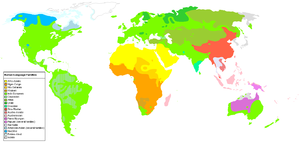- Portal:Language
-
- Wikipedia portals:
- Culture
- Geography
- Health
- History
- Mathematics
- Natural sciences
- People
- Philosophy
- Religion
- Society
- Technology

A language is a system of symbols, generally known as lexemes, and the rules by which they are manipulated. The word language is also used to refer to the whole phenomenon of language, i.e., the common properties of languages. Though language is commonly used for communication, it is not synonymous with it. The scientific study of language, its historical development, characteristics, and use in society is known as Linguistics.
Human language is a natural phenomenon, and language learning is instinctive in childhood. In their natural form, human languages use patterns of sound or gesture for the symbols in order to communicate with others through the senses. Though there are thousands of human languages, they all share a number of properties from which there are no known deviations.
Humans have also invented (or arguably in some cases discovered) many other languages, including constructed human languages such as Esperanto or Klingon, programming languages such as Python or Ruby, and various mathematical formalisms. These languages are not restricted to the properties shared by natural human languages.
Language of the month (2009)
Leonese derives directly from Latin and took shape in the early Middle Ages. At that time, Leonese was the official language of the Leonese Kingdom and achieved a high codification grade [1]. Leonese developed a proper codification in the territories of the actual provinces of Llión, Zamora and Salamanca and in the Leonese territories in the actual Portugal, especially in the District of Braganza. So, the local laws called "Fueros" are mainly written in Leonese, and the documentation from the monasteries in this land is also in Leonese.
Middle Ages
The first written text in Leonese is the Nodicia de Kesos (959 or 974); other works in the language include Fueru de Llión, Fueru de Salamanca, Fueru Xulgu, Códice d'Alfonsu XI, ou Disputa d'Elena y María[2] or Llibru d'Alixandre[3].
Modern Era
The Modern Era signifies a new opportunity for Leonese to show that big writers could also use it for writing important pieces. Writers like Torres Naharro, Juan del Encina, Lucas Fernández or Torres Villarroel in the Modern Era cultivated Leonese, which however came on the verge of disappearance during the XIXth century.
19th and 20th centuries: International research
International philologues of the XIXth century, like Gessner, Hanssen, Staaff or Menéndez Pidal, in Europe and America, started to describe Leonese. Some writers like Caitano Bardón (Cuentos en Dialecto Leonés), Luis Maldonado or Aragón Escacena (Entre brumas) restarted the Leonese literature in the early XXth century.
Nominate | Archive- ^ Morala, R. (2004): Norma y usos gráficos en la documentacion leonesa. In: Aemilianese I, S. 405-429.
- ^ Menéndez Pidal, R.: "Elena y María. (Disputa del Clérigo y el Caballero). Poesía leonesa inédita del siglo XIII". RFE 1, pp. 52-96. 1914
- ^ Menéndez Pidal, R. "El Dialecto Leonés". Madrid. 1906
Picture of the month (November 2011)
Group of sculptures in Ulm. The inscription in Upper German dialect states "Dr Metzgr ond dr Baur beim Handl om dui Sau" (that means "The butcher and the farmer bargaining about the sow") Nominate | Archive
Nominate | ArchiveLanguage topic of the month (June 2009)
High German consonant shift
In historical linguistics, the High German consonant shift or second Germanic consonant shift was a phonological development (sound change) which took place in the southern parts of the West Germanic dialect continuum in several phases, probably beginning between the 3rd and 5th centuries AD, and was almost complete before the earliest written records in the High German language were made in the 9th century. The resulting language, Old High German, can be neatly contrasted with the other continental West Germanic languages, which mostly did not experience the shift, and with Old English, which was completely unaffected.
Nominate | ArchiveDid you know...
Articles
Languages of the world Languages of Africa: Arabic, Berber, Chadic, Cushitic, Kanuri, Maasai, Setswana, Swahili, Turkana, Xhosa, Yoruba, Zulu, more...
Languages of the Americas: Aleut, Carib, Cherokee, Inuktitut, Iroquois, Kootenai, Mayan, Nahuatl, Navajo, Quechuan, Salish, American Sign Language, more...
Languages of Asia: Arabic, Bengali, Chinese, Japanese, Hebrew, Hindi-Urdu, Kannada, Marathi, Korean, Kurdish, Malayalam, Mongolian, Persian, Sanskrit, Tamil, Tibetan, Thai, Turkish, Vietnamese more...
Languages of Austronesia: Austric, Fijian, Hawaiian, Javanese, Malagasy, Malay, Maori, Marshallese, Samoan, Tahitian, Tagalog, Tongan, Auslan, more...
Languages of Europe: Basque, Czech, Danish, Dutch, English (book), French, German, Greek, Italian, Leonese, Norwegian, Polish, Portuguese, Romanian, Russian, Slovak, Spanish, more...
Constructed languages: Esperanto, Ido, Volapük, more...
Language types Agglutinative language, Analytic language, Constructed language, Creole, Context-free language, Extinct language, Dialect, Fusional language, Inflectional language, International language, Isolating language, Language isolate, National language, Natural language, Pidgin, Pluricentric language, Polysynthetic language, Proto-language, Sign language, Spoken language, Synthetic language, Variety (linguistics)
Linguistics (Portal, Book) Applied linguistics, Cognitive linguistics, Accent (linguistics), Computational linguistics, Descriptive linguistics, Eurolinguistics, Generative linguistics, Historical linguistics, Lexicology, Lexical semantics, Morphology, Onomasiology, Phonetics, Phonology, Pragmatics, Prescription, Prototype semantics, Psycholinguistics, Semantics, Stylistics, Sociolinguistics, Syntax
See also: List of linguists
Writing systems Alphabets: Arabic alphabet, Cyrillic alphabet, Hebrew alphabet, Latin alphabet, more...
Other writing systems: Abjad, Abugida, Braille, Hieroglyphics, Logogram, Syllabary, SignWriting more..
See also: History of the alphabet, script
Categories
Linguistics: Computational linguistics • Grammar • Historical linguistics • Morphology • Phonetics • Phonology • Pragmatics • Reading • Semantics • Sociolinguistics • Syntax • Writing
Languages: Language families • Pidgins and creoles • Sign languages
Linguists: By nationality • Grammarians • Historical linguists • Morphologists • Phoneticians • Phonologists • Sociolinguists • Syntacticians • Translators
Wikipedia books: English
Stubs: Constructed languages • Languages • Linguists • Pidgins and creoles • Typography • Vocabulary and usage • Writing systems
Categories:- Culture portals
Wikimedia Foundation. 2010.


